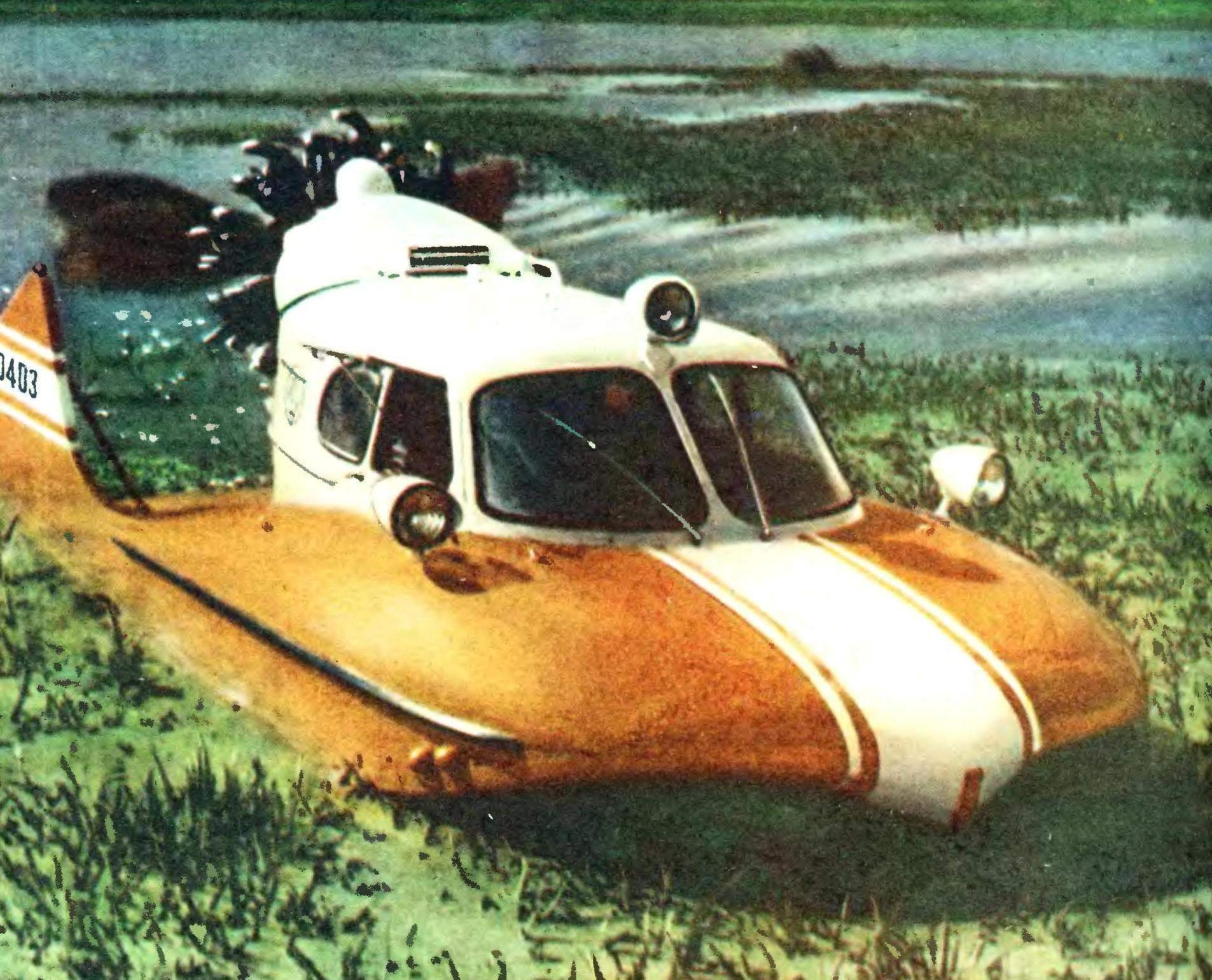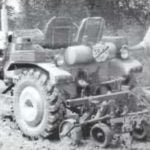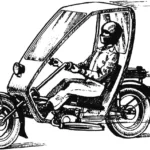 The development of the untold wealth of the North, Siberia and Far East is impossible without specialized vehicles. Many more years will have to transfer the cargos to remote parts of the country in the most difficult off-road conditions, deep snow, hummocky ice, by freezing the swamps and reeds ducts.
The development of the untold wealth of the North, Siberia and Far East is impossible without specialized vehicles. Many more years will have to transfer the cargos to remote parts of the country in the most difficult off-road conditions, deep snow, hummocky ice, by freezing the swamps and reeds ducts.
The variety of conditions that must be operated in a transport, and high demands on speed and the terrain is enormously complicate the task of creating a universal machine. In the winter, the high speed movement on flat terrain have a snowmobile, cross country — motonarty, summer in shallow rivers successfully operate gliders with a propeller. In internavigational period to melt the fragile ice during freeze-up on floating ice floes and winter as “rotten” rivers teeming with openings, generally none ground transport could not provide reliable transport links.
For many years engineering has worked to create a machine that could change its structure, without installing additional devices that increase the permeability, to serve for the movement at any time of the year.
Greatest luck in this area was achieved by group of young professionals working under the direct supervision of A. N. Tupolev. They created a snowmobile amphibian was intended to provide postal transport and the organization of operational communications during the winter off-road and in internavigational period. The machine consists of a boat-a ski streamlined shape, driven by a pusher propeller. In the winter, in the snow, raised the bow part of the hull of the boat-ski inhibits rolling, a counter-flow of air, and due to aerodynamic forces occurs, the pressure differential between the top surface and the bottom, i.e. the lifting force. At speeds of about 80 km/h it is almost a third reduces the pressure of the boat on the snow. Track depth becomes very small, and accordingly decreases the resistance to movement of the machine. When operating on the water a large area malotilate ostrozkogo bottoms allows to a shallow draught and good stability.

Fig. 1. The flow diagram of snowmobiles, amphibious counter-flow of air when driving on the snow and the formation of a lifting force.

Fig. 2. The constructive scheme of a snowmobile-amphibian with the motor M-11:
1 — deck profile, akantovye cab, 2 — front trunk. 3 — tailgate 4 — frame № 4, 5 — eyebolt, 6 — beam, 7 — the lantern 8 — chair, 9 — fold lamp 10 is the main trunk, 11 — pole, 12 — the hood 13 — oil tank 14 — kotikovye fire, 15 — the right navigation fire, 16 — propeller, 17 — drive, 18 — motor frame, 19 — left and navigation-fire 20 — left hand drive, 21 — left Kiel, 22 — profile dock skin side on the bottom, 23 — deck 24 — redan, 25 profile stikoudi the trim side of the deck, 26 — the left gas tank, 27 — formers, 28 — stringers.
Smooth, with no protruding parts of the hull lines, is provided with a step, give the opportunity to pass freely through the overgrown water bodies and confident glissirovat in shallow water, where the water layer is only 50 mm.
Snowmobile amphibious as mail option is designed to accommodate two people — the driver and accompanying mail and freight post cargo (up to 650 kg in winter and 300 kg in summer). In passenger option the machine can be used for the transportation of four other persons. The layout of amphibians provides convenient access to all units, comfort for crew and passengers, allowing normal operation in the harsh winter conditions and summer.
Structurally, the Tu consists of a boat-the ski located in the Central part of the enclosed cockpit, which houses the crew, the cargo and are the controls and monitoring devices; the pylon on the aft edge of which is hung on the frame of the internal combustion engine is mounted with its shaft propeller. Building metal, riveted. All the elements 13 of the transverse frames, longitudinal stringers and planking made I.” duralumin D-16T. To ensure the unsinkable boat-a ski is divided into three compartments by two sealed bulkheads frames No. 4 and 10.
Malotilate the bottom provided for better gliding on the water with radiation redan. It is located on 66% of the length from the forward edge and has a height at the side of 50 mm. the Bottom to increase durability when driving on ice, snow sastrugi and ice hummocks made double. The main part consists of riveted panels with lining sheets D-16T with a thickness of 2 mm and extruded bulb profile. The second bottom — running sole — removable. It is made from leaves of the D-16T with a thickness of 1 mm, which are glued on the polyethylene thickness of 3-5 mm with a low coefficient of friction.
On the bottom there were three podraza stainless steel: keel and two side. They provide stability on course and prevent it from sliding sideways on the ice, when the machine goes with a considerable roll.
Deck boats-ski rounded shape. Her bow is hermetically closed the hatch of the trunk. It loads the Luggage compartment, occupying the space from bow to bulkhead No. 4. Further (towards the transom) is located cabin. Her front — well glass lamp welded construction. Aft it goes into the pole, ending at the frame No. 10. From the sides of the cabin are glazed folding doors.
In the cabin before the driver of the machine located controls, control panel with all the levers of the engine and its components, there are numerous handle faucets — fire, air systems, etc. Located on top of the dashboard with the control devices of the engine unit and the toggle switches control plants and lighting equipment.
The driver and passenger sit in a swivel chair with soft foam cushions, covered with leatherette. Behind the seats is a cargo area. In the passenger version, you can set the seats for four passengers and still space for Luggage.
In the stern of the boat-skis installed on the sides vertical tail — two air keel. They are riveted, aluminum, attached to them with power nodes for attachment of the rudder control machine. Keeley at the same time serve as a protection of a zone of rotation of the propeller.
If the machine is afloat, the wheels work like a conventional water rudder boats. The upper part is in the stream, rolling during the movement, and the jet of air formed by the screw and acts as a rudder for the aircraft, greatly enhancing management efficiency.

Fig. 3. Diagram snowmobile-amphibian.

Fig. 4. Instrument panel and controls.

In the harsh conditions of off-road, through a small shallow river, through deep snow, hummocky ice, marshes and rushy streams able to transport cargo snowmobile-amphibian designed by A. N. Tupolev
For movement on snow and ice the lower part of the rudder equipped with steel skates. Thus, here, where the deviation of control surfaces to perform the desired maneuver of the driver running simultaneously, and the upper (air) and lower parts.
When you “capture” of the wheel itself to failure rudders are deployed in different directions, “plow”, becoming a brake.
When you turn the steering wheel while taking it on yourself is only one (internal to the turn) wheel. This position is used when driving snowmobiles, amphibious overgrown with reeds or seaweed to the water.
Structurally, the control system consists of the steering column, hinge, push-pull rods and intermediate units. The wheel planted on the steering column through system of cables transmits force for the main rocker control columns, which is further connected to the rocking of the rudder rigid rods.
The original snowmobile was mounted five-cylinder engine type M-11 air-cooled power 100 HP In later versions it was replaced by the engine AI-14P 260 HP
Place the engine in the rear part of the machine on tubular welded frame with a shock-absorbing racks. The space between the frame 10 and the engine forms an engine compartment, an indoor removable hood. Above the engine compartment, under the fairing, located the oil tank with the pipelines of the oil system. Fuel capacity is concentrated in two fuel tanks, hidden in the boat-the ski on the sides of the cab. The fuel filler pipe is withdrawn to the wells on the deck.
Air screw high specific thrust — wood, block. The screw is mounted on the splined shank of the motor shaft through the propeller hub, which, in turn, is fixed contrawise nut. On the deck of the right and left sides of the installed lights and navigation lights: – marker — red and green on the upper parts of the keels and kotikovye — white — pin-bracket attached to the cowl the oil tank. Inside the cabin there are ceiling lights and socket perekisnoe lamp.
I. USENALIEV, engineer



